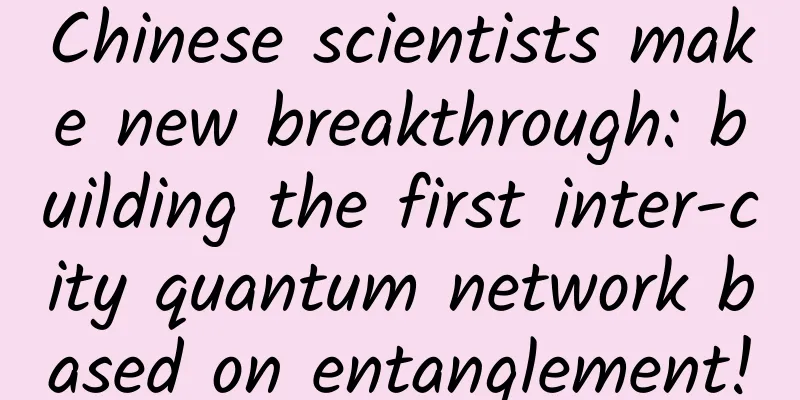Chinese scientists make new breakthrough: building the first inter-city quantum network based on entanglement!

|
(Photo courtesy of TUCHONG Creative) Recently, the University of Science and Technology of China used single-photon interference technology to achieve quantum entanglement between long-distance quantum storage nodes, and based on this, built the world's first city-wide three-node quantum network based on quantum entanglement. This work has increased the distance of the actual quantum entanglement network from tens of meters to tens of kilometers. The relevant results were published in the world's top academic journal Nature in May 2024. So what is a quantum entanglement network? What is its significance? The magic of quantum entanglement Quantum entanglement is a peculiar phenomenon in quantum mechanics. It describes a quantum superposition state in which two or more particles are linked together, or a quantum state in which different physical quantities of a single particle are linked together. The formation of this association is often restricted by conservation laws, such as conservation of momentum or conservation of energy. That is, put all these quantum superposition states together, remove those parts that do not conform to the conservation laws, and what remains is the quantum entangled state. For the quantum entanglement of two particles, even if the two particles are far apart, their quantum states cannot be described independently, but can only be described by the overall quantum entanglement wave function. When one of the particles is measured and its state is determined, the state of the other particle is immediately determined. This cross-space and time correlation that goes beyond classical physics was called "spooky action at a distance" by Einstein. Quantum bit transmission Quantum entanglement can be used to transmit quantum bits, the smallest unit of quantum information, which is called quantum teleportation . Since long-distance quantum entanglement can transmit quantum bits over long distances, if quantum entanglement can form a network, then quantum bits can be transmitted over long distances on this network. Whether it is future distributed quantum computing, distributed quantum sensing, or quantum precision measurement, a network is needed to continuously transmit quantum bits over long distances, so we must first realize such a quantum entanglement network. Important quantum memory The core of the quantum entanglement network is quantum memory. Without quantum memory, the difficulty of adding nodes to a quantum entanglement network is exponential . That is, the probability of forming quantum entanglement between all two adjacent nodes must be multiplied together, and it will quickly decay to near zero as the network scale grows. With quantum memory, two adjacent nodes can first form quantum entanglement and store it, and then the third node can also form quantum entanglement with the quantum memory to complete the entanglement exchange, and so on, until the quantum memory can no longer be read. The difficulty of adding nodes to such a quantum entangled network is logarithmic , and the lifespan and operation accuracy of the quantum memory determine the scale of the quantum entangled network. New breakthrough by Chinese scientists Quantum memory itself is a very challenging technology, even more difficult than quantum computers. After years of development, it can only support multi-node quantum entangled networks of tens of meters before 2024, and it cannot leave the laboratory. After long-term technical accumulation and innovative photon phase control technology, the quantum storage team of the University of Science and Technology of China has accurately controlled the phase difference between the reading and writing laser beams of the quantum memory, greatly improving the operational accuracy of the quantum memory, thereby realizing a quantum entangled network between three quantum memories separated by more than ten kilometers . The total length of the entire network is dozens of kilometers, which has the conditions for realizing a metropolitan area network. So, this work is like the computer network for transmitting classical bits, which had its prototype in the late 1960s, the ARPANET. The quantum entanglement network for transmitting quantum bits also had its prototype in the 2020s of this century. This article is a work supported by the Science Popularization China Creation Cultivation Program Author: Zhang Wenzhuo, founder of Quametic Quantum Reviewer: Yin Zhangqi, Professor of Beijing Institute of Technology Produced by: China Association for Science and Technology Department of Science Popularization Producer: China Science and Technology Press Co., Ltd., Beijing Zhongke Xinghe Culture Media Co., Ltd. |
<<: “Xiangshou Crab” has become a hot topic. Are pet crabs going to become internet celebrities?
Recommend
Beichen Asia Market: Analysis of Beijing Automobile Market in April 2022
1. New car transaction situation In April, Beijin...
Read the full text of Chen Mangge and Ye Nanxian for free, and the latest ending of Chen Mangge and Ye Nanxian!
A fire burned away all of Shen Mangge's love ...
The reason why the sharing website's ranking dropped after the https transformation!
To do SEO, you need to follow the trend. Baidu se...
How to choose event promotion channels and quickly launch events?
New media operation, channel selection, and maxim...
Android SurfaceView plays video source code
SurfaceView Let's first introduce how most so...
Didi Game Center - A "beautiful mistake"
I believe everyone already knows: Didi issued an ...
What is the value of smart TV in the living room in the era of the Internet of Everything?
Ten years ago, the Internet of Everything seemed ...
Get App Competitive Analysis
When I was studying competitor analysis , I found...
What are the requirements for adding keywords to Baidu’s bidding promotion?
What are the requirements for adding keywords to ...
How to speed up NFC development?
In 2014, thanks to Apple's participation, NFC...
Can you eat the peel of fruits? These kinds of fruits are not only edible, but also very nutritious!
It's the hot summer season, and it's time...
Baidu bidding data analysis skills, what aspects should be considered in bidding data analysis?
In Baidu bidding techniques, data analysis is of ...
I was aware that I was dreaming and I could even control it...
Dreaming is a confusing, hazy experience that is ...
The magic weapon for subway advertisements to flood the screen!
As the leader in outdoor advertising, subway adve...
APP front-line practical summary: How to operate a product line externally from 0 to 1?
Before I start writing, let me explain my backgro...









